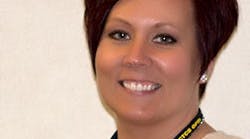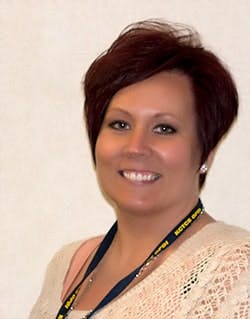Stearns, Ky., native Amanda Saam graduated in May from the Industrial Maintenance Technology program at Somerset (Ky.) Community College. Earlier this spring, she was a featured speaker at "Learn How to Get More Women in the Picture," an event that took place as part of a National Institute for Women in Trades, Technology and Science workshop in Versailles, Ky. The event was sponsored by AMTEC (Automotive Manufacturing Technical Education Collaborative) and the Kentucky Community & Technical College System's professional development office. Saam recently spoke with Plant Services for a Big Picture Interview about what led her to the program as an adult learner, her experience as the only female graduate in her class, and the opportunities available for women in the industrial maintenance field.
PS: Tell me a little about your journey and how you arrived at Somerset's program.
AS: It's been a wild ride. It took me a little bit of time to figure out what I wanted to be when I grew up. I've had so many types of different jobs, and some of them were a good fit; some of them weren't. When my ex-husband and I divorced, I found myself needing a better job to take care of my kiddo and myself, and I had so many people that I knew that had graduated from different programs who just couldn't find work in their field. So I did some research to see what exactly people were looking for. Come to find out, not only are there not enough women in this field, but there really aren't enough men, either. A good maintenance technician is hard to come by.
That's when I decided, well, you know, I do have a natural inclination for mechanical things, so why not? And then I found out what they made (in terms of income), and it was like, "We don't let all the doctors be men, and we don't let all the lawyers be men. Why are we letting all of this money be made by men?" So it really became a different kind of mission.
PS: When you were growing up, what cultivated your interest in mechanical processes?
AS: I've always watched my dad work on things, and I've been the kid who takes something apart to see how it works and tries to get it back together. In my child's school once, they were discussing different roles, and they said, who cooks in your house? She said, "Mommy and Daddy." "Who cleans?" "Mommy and Daddy." "Who fixes things?" She said, "Mommy."
PS: What led you to this particular program?
AS: I have an uncle who has worked in the field for a number of years at a local factory, and I just asked him, how difficult would it be for a woman to get a job in this field? He said that really they are looking for women.
This (program) is not far from where I live, so I still have the support system from my family. The commute wasn't bad, and once I got into the program and met the instructors – I honestly can't say enough about the support I've received from the instructors in the program. They never made me feel like the girl in the program. They expected the same from me as they did from the males. It just is such a wonderful program; I really cannot speak highly enough about this program.
PS: Tell me a little about how the program was structured, and what a typical term might look like.
AS: I started out on the electrical side. We spent about half of the semester in lecture learning how electricity works, and then the other half of the semester we spent in the lab drawing schematics and wiring motor controls. We learned about bearings and lubrication and the importance of that. And of course the first thing they teach is safety, because it can be such a dangerous job. Then the next semester we did programmable logic controllers. We had to draw schematics and program little robots to do things.
PS: What was a favorite thing that you did in the program? Was there a moment where you thought, "Wow, I'm definitely in the right place"?
AS: I very much enjoyed fluid power, hydraulics. That's been a very interesting thing. And I've also very much enjoyed machining. It's so amazing to look at this raw piece of metal, and somewhere hiding in there is this tool you're going to make, or a bit. I've always been an artistic soul in a way, so it seems like a metal art to me.
PS: Were there other women in your program?
AS: I started out with one other female, but she went on to something else. Out of my graduating class in this program, I was the only female.
PS: You say the instructors were all amazing – did you feel like it was very collaborative and cooperative with your classmates as well?
AS: Yes. I never had any problems with anyone. As a matter of fact, once, I turned in some paperwork with the financial aid office, and the lady at the desk looked at the program I was in and said, "Are you really in our industrial maintenance program?" And I said, "Yes, ma'am." And she said, "I didn't know we had any women in that program." I said, yes, there's a couple of us. She said, "Do they give you a hard time?" And I said, "No, ma'am; I give them a hard time." It's all in good fun. They've all been fantastic.
PS: What were some of the things you learned in the program about the dynamics of the field and the opportunities that are out there now for both men and women?
AS: It does seem to be that they are trying to seek out and attract more females. But maybe (more women would enter the maintenance field) if we could inform more women that, look, you're going to receive support; you don't have to have a background. Because I hadn't done anything like this before, but you can excel. As long as you show up and you're determined, and you're eager to learn, there's room for all of us to be successful.
PS: What's next for you?
AS: I've submitted a lot of resumes. The doors are cracked, and I'm just waiting to see which opportunity to take.
PS: You would say coming out of this program that you're very excited and optimistic about your prospects?
AS: Yes, I really am. I feel very equipped for success. Some of the instructors, they really build up your confidence, and it's not, you know, an empty foundation. I'm certain that I will be successful.
PS: Was there a time in your classes when an instructor went above and beyond?
AS: I know that my fluid handling instructor, anything that I've ever needed, whether I just wasn't getting something or I needed to clarify something, he has been there. He was always saying, "You're going to kick (butt), girl." He says: "I'm very proud of you. You're a wonderful student." He's constantly building me up. And it's not just me. I've seen him be this way to a number of students. It's almost as if we're all his kids, and he's going to make sure that we fly.
PS: What are some of the hang-ups that you think might keep women from participating in this type of program?
AS: I think that a lot of times it's so intimidating to go into a male-dominated field, especially if you don't have that background. It's hard to know whether or not you can keep up with the boys or whether you're going to be having people roll their eyes at your attempts. But I have not run into any of this. And I just think that if more women knew that they could have a very positive experience... I've even thought about trying to get something started as far as a scholarship opportunity for women to enter a student program, because that would help. Being a single mom, a recently divorced single mother, I needed whatever I could get to help me through this. A scholarship or a grant or a loan or a work program, whatever I could get my hands on, I needed. And I really felt supported from every direction. It wasn't easy. And it's not going to be easy. But anything worth having, you have to work hard for. I'd be the mom sitting on the sidelines of my kid's volleyball game with homework spread out in front of me, cheering one minute, and figuring heat calculations the next. But hopefully I'm teaching her and showing her. My ultimate goal is to be the type of woman that I want her to grow up to be. And that's someone who, you see what you want, and you go get it, one way or another.

